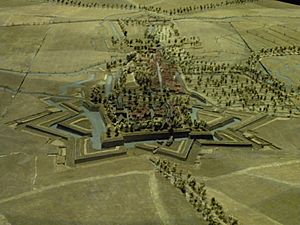Siege of Bouchain (1712) facts for kids
Quick facts for kids Siege of Bouchain (1712) |
|||||||
|---|---|---|---|---|---|---|---|
| Part of the War of the Spanish Succession | |||||||
 Plan-relief of the Bouchain fort. |
|||||||
|
|||||||
| Belligerents | |||||||
| Commanders and leaders | |||||||
| Strength | |||||||
| 20,000 40 artillery pieces |
2,000 23 guns 2 mortars 2 swivel guns |
||||||
| Casualties and losses | |||||||
| 400 killed and wounded | 2,000 killed or captured | ||||||
The Siege of Bouchain was an important battle that happened from October 1 to October 19, 1712. It was part of a bigger conflict called the War of the Spanish Succession. During this siege, the French army, led by Duc de Villars, won a big victory. They surrounded and captured the strong fort of Bouchain, which was held by the Allied forces. About 20,000 French soldiers fought for 18 days. The 2,000 Allied defenders, made up of Dutch and Imperial troops, had to give up on October 19.
The Road to Bouchain
The Allies had captured Bouchain from the French just one year before, in 1711. That siege lasted 34 days.
In July 1712, the French Marshal Villars won a key battle at Battle of Denain. This victory helped him take control of the supply lines of the Allied forces. After this, Villars' army captured several other forts. These included Marchiennes, Douai, and Le Quesnoy.
Villars was very determined. He began the siege of Bouchain on October 1, even before the siege of Le Quesnoy was finished. Villars and King Louis XIV decided to attack the town directly. They did not want to just block it off. This was because they wanted to save their soldiers from discomfort. Also, cutting off the town, which was surrounded by water, would have been too hard.
Villars wrote about his plans:
I am pressing vigorously to open the trenches...two days saved will be of great benefit when the rains arrive.
He knew that starting the attack quickly would help before the bad weather came.
The Siege Begins
French officials helped the army by providing tools and workers for the siege. The Allied defenders inside Bouchain had 23 cannons, 2 mortars, and 2 smaller swivel guns. The French army attacking the fort had 40 artillery pieces.
The French had to dig trenches to get closer to the fort. On the left side, their progress was slow. This was because the Allies had dug their own tunnels to counter the French. This forced the French to dig very carefully.
On the right side, eight companies of grenadiers attacked. They stormed and captured a protected pathway called the covered way. This attack cost them 18 soldiers killed and 100 wounded. On the left side, the French lost fewer men, only 12 to 15. This was because they had dug more protective trenches.
Villars knew that direct attacks without enough artillery support could cause many casualties. However, he believed that moving quickly was more important. He even went against the advice of his engineers. The French also used a fake attack to confuse the defenders. They built only two main trench lines, even though three were usually recommended.
After the Battle
Villars' victory at Bouchain was very important. It undid the capture of Bouchain by the Duke of Marlborough a year earlier. This victory helped end the war for the British and Dutch. The Treaty of Utrecht was signed soon after. This treaty made sure that the strong forts in northern France, built by Vauban, remained under French control.
Who Was Affected?
The French army lost about 400 soldiers, either killed or wounded. This was about 2% of their fighting force. The entire Allied group defending the fort was captured by the French.
Images for kids
 | John T. Biggers |
 | Thomas Blackshear |
 | Mark Bradford |
 | Beverly Buchanan |


